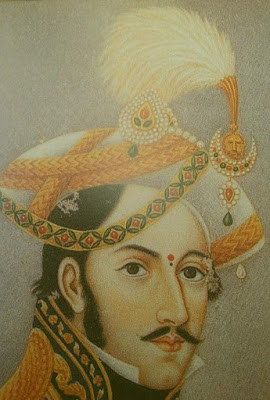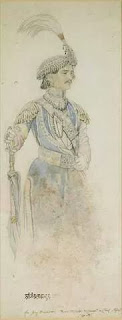Mathabar Singh Thapa was the first person in Nepalese history to be designated prime minister. He was a resplendently dressed dandy, cocky too and walked with a swagger after he was recalled by the court of Nepal following a six year long exile in the Punjab. He was the nephew of the paramount leader Bhimsen Thapa, sister of the Queen Regent of Nepal Lalit Tripura Sundari, both deceased. He was going to exact revenge on the sons of Damodar Pandey for conspiring to annihilate Bhimsen. He probably introduced the Bird of Paradise feathers in the Nepalese crowns in his vanity. He was going to restore the beleaguered Nepalese Army, following the humbling at Sugauly, to former glory! The Governor General in faraway Calcutta was keeping watch and he even complained to King Rajendra Bikram Shah that his prime minister was breaking the spirit of the Treaty of Sugauly by raising the army to Bhimsen Thapa’s levels.
 |
| P. M. Mathabar Singh Thapa |
Following the death of the senior Queen Samrajya Luxmi Devi, the junior Queen Rajya Luxmi had developed an ambition only he, Mathabir, could fulfill she was convinced. A strong man at her side would be the catalyst needed to unseat the rogue crown prince of the country her stepson Surendra and install her own son Ranendra as the next in line to the throne. Surendra was increasingly unpopular due to his atrocious behavior. The court and the military would follow her reasoning with Mathabar at her side. She would be able to neutralize her husband the king if he dared to oppose her plan. She had invited Mathabar from the Punjab to lead her government. Things were working as per her plan.
She had also taken a lover people whispered. Gagan Singh Bhandari was a lowly army officer once but his rise to power within the royal household via the military was nothing but phenomenal! In time he commanded more troops than the prime minister Fateh Jung Shah but that would come later. Jung Bahadur Kunwar the nephew of Mathabar Singh Thapa, son of his elder sister Ganesh Kumari, was rehabilitated following the arrival of Mathabar to power. Jung was Mathabar’s favorite nephew, it was he who had given Bir Narsingh Kunwar the grander sounding martial name of Jung Bahadur, a name he was destined to carry to glory!
These were the main players of the time. Sir Henry Lawrence the British Resident nicknamed the King, Mr. Nepaul, the queen, Mrs. Nepaul and the crown prince, Master Nepaul. It was only a matter of time who among them would hold sway! Queen Rajya Luxmi started to get disappointed with the untrustworthy Mathabar as he, instead of supporting the queen on her quest to make her son the successor, was inclined to favor the crown prince. He was playing a safe hand by not upsetting the king and his court. The queen started scheming again. It was imperative that she got rid of Mathabar before he consolidated his hold on Nepalese army and politics just like his uncle Bhimsen Thapa had done. Then surely it would be too late! She wanted to promote Gagan Singh to the post of prime minister.
What happened next cannot be refuted. On the night of 17 May, 1845 Prime Minster Mathabar Singh was summoned to the royal place under the pretext that the queen had met with an accident. He was warned against visiting by his mother it is said. But cocky that he was and sure of himself he walked into a trap. He met the king and while conversing with him, he was shot from behind and fell dead. Some have reported that the king kicked his dead body, such was his rage possibly fueled by the pillow talk of the queen poisoning his ears. There was no reason whatsoever why the king would want him dead as he was subservient to the king and the crown prince. But King Rajendra was a weak person.
Who had carried out this dastardly act has been the subject of much debate in Nepal ever since. Historians have come up with different stories pointing fingers at King Rajendra himself, paid assassins, Gagan Singh and of course, Jung Bahadur Kunwar. Queen Rajya Luxmi wanted Mathabar Singh Thapa removed to realize her ambition; that is a fact. Would she rely on a relatively unknown Jung, a favorite nephew of the man himself to carry out this assassination? Wouldn’t he divulge this plot? Jung had everything to gain by having his uncle in the seat of power. He would not have known the turn of events after his assassination and where his, Jung’s, own destiny would reside.
 |
| Young Jung Bahadur |
Laurence Oliphant, the South-African born British writer of A Journey to Nepal with the Camp of Jung Bahadur, a book he wrote after he accompanied the retinue of Jung Bahadur upon his return from England to Nepal, cites Jung showing a portrait of Mathabar to him in his residence in 1851 and telling him that it was his poor uncle and he had to shoot him. The all powerful Jung Bahadur in 1851 had no reason for a mea culpa. Was it remorse or more likely were his words lost in translation? Jung Bahadur had learnt only a few phrases in English and he was not conversant with any degree of fluidity. The wife of the doctor at the British Residence Elizabeth Oldfield describes a wedding of the daughter of Jung Bahadur Rana, as he was known by then, to the Crown Prince Trailokya Bikram Shah in 1857, some six years later, greeting the English party with, “How do you do?” and Elizabeth writes that besides this phrase Jung knew a few more like – “Shake hands”, “Sit down”, “Come here” – but did not speak much English.
Who stood to gain the most from this assassination? As history unfolds, it was Gagan Singh Bhandari, of course. Soon after, Gagan Singh was in command of six regiments and he was the de facto military chief and more influential than the prime minister Fateh Jung Shah. He had the most to gain and the queen trusted him to do her bidding. If he didn’t pull the trigger himself, he must have assassinated Mathabar with the help of paid assassins. This is one of history’s mysteries.


